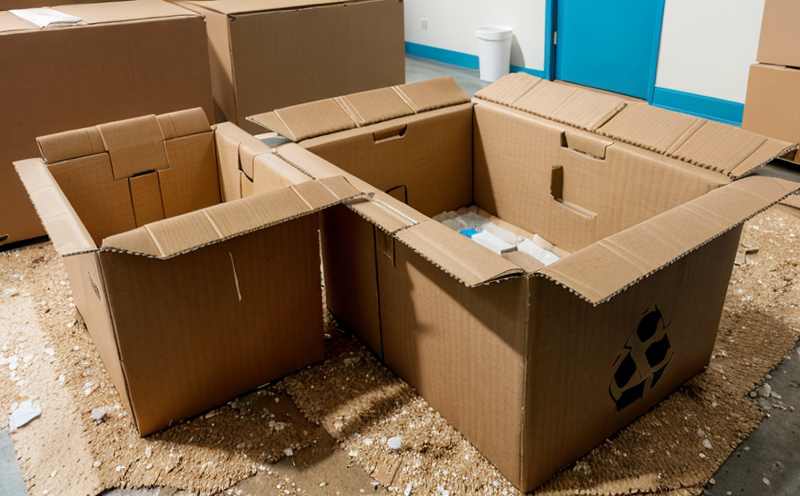ISO 11093-3 Recycled Board Flat Crush Resistance
The ISO 11093 series of standards is a cornerstone in the quality assurance and compliance framework for recycled paperboard, pulp, and cardboard materials. The specific test outlined in ISO 11093-3 assesses the flat crush resistance (FCR) of recycled board. This property measures how resistant the material is to the application of pressure that can cause it to collapse or flatten under load.
This test is crucial for industries reliant on recycled materials, as it ensures product consistency and reliability in terms of performance. Understanding FCR helps manufacturers ensure their products meet the required standards for durability and functionality, especially when used in packaging applications where structural integrity is paramount.
The flat crush resistance test is particularly relevant to sectors like packaging, logistics, and manufacturing, which depend heavily on recycled paperboard for its environmental benefits and cost-effectiveness. By adhering to ISO 11093-3, companies not only enhance the quality of their products but also contribute positively to environmental sustainability goals.
The test involves subjecting a specimen cut from the recycled board to increasing levels of pressure until it flattens. The resistance is measured in Newtons per square meter (N/m²). This quantitative measure provides critical insights into the material's performance and helps in optimizing manufacturing processes for better outcomes.
In real-world applications, this test ensures that recycled paperboard can withstand the stress encountered during shipping and handling without collapsing or compromising its structural integrity. The results of ISO 11093-3 are essential for quality managers, compliance officers, R&D engineers, and procurement professionals who need to ensure that their products meet stringent standards.
The test is performed using a specific apparatus designed to apply uniform pressure across the specimen's surface. This ensures accurate measurement and repeatability of results, which is critical for consistent product quality.
Scope and Methodology
| Test Procedure | Details |
|---|---|
| Sample Preparation | The specimens should be cut from the recycled board in accordance with the ISO 11093-3 specifications. This ensures that all samples are of uniform size and shape, which is crucial for accurate testing. |
| Testing Apparatus | The test is conducted on a flat crush resistance tester. The apparatus applies pressure uniformly across the sample until it flattens to a specified extent. |
| Pressure Application | The pressure is gradually increased in stages, and the point at which the specimen flattens is recorded as the FCR value. |
| Data Collection | All measurements are meticulously documented. This includes the pressure applied and the degree of flattening achieved. |
| Repeatability | Multiple tests may be conducted to ensure consistency in results. Repeatability is crucial for quality assurance purposes. |
The methodology described ensures that all testing follows the ISO 11093-3 guidelines, providing reliable and consistent data. This approach allows manufacturers to make informed decisions about their manufacturing processes, ensuring they produce products that meet or exceed industry standards.
By adhering to these standardized procedures, companies can ensure that their recycled paperboard meets the stringent requirements set forth by international bodies like ISO. This not only enhances product quality but also contributes positively to environmental sustainability efforts.
International Acceptance and Recognition
The ISO 11093-3 standard for flat crush resistance is widely recognized and accepted across the global paper, pulp, and cardboard recycling industry. Its international acceptance makes it a critical tool for manufacturers aiming to meet regulatory requirements and ensure product quality.
ISO standards are renowned for their rigor and consistency, which has led to widespread adoption in various countries around the world. The flat crush resistance test, as specified in ISO 11093-3, is particularly favored by industries that demand high-quality recycled materials due to its ability to measure critical performance characteristics.
Companies that comply with this standard benefit from enhanced product reliability and trustworthiness, which can translate into competitive advantages. The international recognition of the test ensures that products meet the highest standards, thus gaining acceptance in global markets.
The acceptance of ISO 11093-3 is further underscored by its alignment with broader sustainability goals. By ensuring that recycled paperboard meets stringent quality and performance criteria, this standard helps manufacturers contribute to environmental protection efforts.
In conclusion, the international recognition of ISO 11093-3 underscores its importance in maintaining high standards of product quality and reliability within the recycling industry. Its widespread acceptance by global manufacturers and regulatory bodies highlights its critical role in ensuring compliance with international standards.
Environmental and Sustainability Contributions
The ISO 11093-3 flat crush resistance test plays a pivotal role in promoting environmental sustainability within the recycling industry. By ensuring that recycled paperboard meets stringent quality and performance criteria, this standard contributes significantly to the broader goal of sustainable development.
Recycled materials like paperboard are increasingly sought after for their environmental benefits. The use of ISO 11093-3 ensures that these materials not only meet but exceed the necessary standards for durability and functionality. This, in turn, supports the transition towards more sustainable manufacturing practices.
The test's focus on flat crush resistance is particularly relevant as it ensures that recycled paperboard can withstand the stresses encountered during shipping and handling without collapsing or compromising its structural integrity. Such resilience is crucial for maintaining product performance while minimizing environmental impact.
By adhering to ISO 11093-3, manufacturers contribute positively to environmental sustainability efforts by producing high-quality products with minimal waste. This aligns with broader industry goals of reducing environmental footprint and promoting sustainable resource use.
The widespread adoption of this standard across the global paperboard manufacturing sector underscores its importance in achieving these sustainability objectives. It not only enhances product quality but also supports the transition towards a more environmentally friendly future.





